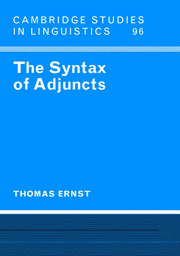Book contents
- Frontmatter
- Contents
- Acknowledgments
- 1 Introduction
- 2 The Semantics of Predicational Adverbs
- 3 The Scopal Basis of Adverb Licensing
- 4 Arguments for Right-Adjunction
- 5 Noncanonical Orders and the Structure of VP
- 6 Event-Internal Adjuncts
- 7 Adjunct Licensing in the AuxRange
- 8 Adjuncts in Clause-Initial Projections
- 9 Conclusions and Prospects
- Notes
- References
- Name Index
- Languages Index
- Subject Index
9 - Conclusions and Prospects
Published online by Cambridge University Press: 12 October 2009
- Frontmatter
- Contents
- Acknowledgments
- 1 Introduction
- 2 The Semantics of Predicational Adverbs
- 3 The Scopal Basis of Adverb Licensing
- 4 Arguments for Right-Adjunction
- 5 Noncanonical Orders and the Structure of VP
- 6 Event-Internal Adjuncts
- 7 Adjunct Licensing in the AuxRange
- 8 Adjuncts in Clause-Initial Projections
- 9 Conclusions and Prospects
- Notes
- References
- Name Index
- Languages Index
- Subject Index
Summary
Overview
I have proposed in this book a theory of the syntax of adverbial adjuncts, specifically of why the various adjunct types have the distribution they do. The account is based on a fairly small number of general and restrictive principles, most of which are independently necessary: principles of phrase structure, of the feature composition of categories, of movement triggers, of weight, of mapping from syntactic structure to semantic representations. Perhaps the most important is the latter. The main explanation for adverbials’ hierarchical position – the major influence on their positions in a sentence – is the interplay between lexicosemantic requirements and compositional rules. In large measure, the theory predicts that a given adverbial may occur hierarchically wherever a well-formed semantic representation results.
The prime evidence for this theory is its ability to predict the distribution of a broad range of adjunct classes. Thus in this chapter, after we recap the main principles of the theory, we review its predictions for adverbial distribution and identify which principles are responsible in each case (sections 9.2–9.3). If the theory is successful in its empirical goal, we may then examine the properties of the theory and its implications for syntactic and semantic theory as a whole. Among other things, my proposals here claim that there is very little syntax specific to adverbials, that weight and precedence relations are relevant in syntax, that phrase structure is only partly asymmetric, and that the mapping to semantics plays the major role in determining distribution.
- Type
- Chapter
- Information
- The Syntax of Adjuncts , pp. 439 - 466Publisher: Cambridge University PressPrint publication year: 2001



